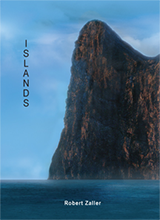Robert Zaller - Islands. Reviewed by Dean Kostos
From Talisman (Winter/Spring 2007)
(Dean Kostos is the author of Last Supper of the Senses (Spuyten Duyvil, 2005), which was submitted for a Pulitzer Prize; The Sentence That Ends with a Comma (Painted Leaf, 1999), which was required reading at Duke University; and the chapbook Celestial Rust (Red Dust, 1994).)
Robert Zaller’s meditatively luminous fifth collection of poems—Islands—is a sequence that functions as a manifold, each part amplifying the whole. Yet the opposite is also true: as the reader starts to hear the overall timbre of the book thrumming below the surface of the language, individual poems voice their distinct qualities. Each one can almost be heard as a persona poem—each island (I-land?) allowing Zaller to articulate aspects of the self.
To accomplish this project, the poet resurrects an underused device, pathetic fallacy—crediting natural forces and elements with human emotions: “The island stretched its pale finger / toward the dying sun” (“The Lost Island,” lines 1-2). He does not employ pathetic fallacy as a mere literary device. He does so to write like ancient poets for whom numina inhabited and animated all things, poets for whom the world in all its awe and awfulness was new.
To give voice to what lies beyond words, Zaller traces his psychic peregrinations with tongue and mouth imagery. The word “tongue” not only refers to language, but also to taste and sensuality, as if the only way to capture the ineffable is through sensuality. After all, the poet’s paradoxical métier is much like the shaman’s—to use words to express what is beyond the province of words. Zaller asserts, “”Here speech / sinks into itself, / the finally unsaid” (“The Silence of the Island,” 24-26). In this poet’s remarkable sleight of hand, “unsaid” hovers linguistically, seeming to function as noun, verb, and adjective simultaneously. Thus he is speaking as the timeless islands would, for they are at once implacable and yet, strangely, protean and dynamic.
Interestingly, these islands may even be more dynamic (and are certainly more central to the poems) than their human inhabitants. Humans become simply another creature roaming these isolated pieces of land: “The lizard seeks his rock, / the tourist his café” (“The Ransom of Heaven,” 9-10). While not entirely erased or ignored, the humans are simply located within a larger whole to give the reader a perspective as broad and unflinching as history itself.
This should not be surprising, inasmuch as Zaller is a professor of history at Drexel University. He is, therefore, uniquely capable of expressing a vatic voice that speaks through, across, and over time. Lesser poets would seem portentous; not so with Zaller. The tactile, almost erotic quality of his language (recalling some of the poems of Theodore Roethke) focuses the reader on the physical stuff of the world. In “The Given” Zaller writes: “Grit grinds our feet, / the beginning and the end of stone, / the prick of being” (12-14). And in “The Story of Islands,” he regales the reader with meaty monosyllabic verbs:
One day an island crawled up from the sea
sucked and folded on itself
licked itself clean
crouched on the horizon
tawny as Rousseau’s desert lion (4-5).
Zaller’s details are testaments to mortality, and thus bespeak his Platonic investigation. He seems to be asking if the material world may be no more than a reflection of something transcendent. Zaller’s metaphysical viewpoint, however, like Elizabeth Bishop’s, eludes facile interpretation; it is (to quote Bishop) “about a mind thinking.” He resists making a direct statement about the order of nature, humanity, and the divine. The poem “Hunger,” however, comes closer to positing Zaller’s cosmography (fluid and questioning as it may be):
God does not judge
more sternly.
They [birds] plummet on salvation
seizing the world
into midair
to remake it
as a beak, a wing, an eye,
the fixed and final form
of our perfection (3-11).
Herein lies another paradox—our “final form” is the dissolution of form, a fate the islands avoid. While they do eventually metamorphose, those changes are so gradual (barring some cataclysm) as to be perceived only by geologists and historians.
Fusing the intellect of the historian with the mercurial sensibility of the poet, Zaller does what Helen Keller did when she wrote on the energies of stones. It requires both a dazzling mind and intuitive receptivity to make audible, visible, and palpable the realities that many of us would otherwise ignore. This is what great poetry attempts to do and why it has always been so essential to human culture.
Yet the “statements” made by mute witnesses to history cannot be fully articulated: “Believe in no god either / except to hone terror / or sharpen ecstasy” (“The Last Island,” 7-9). This is the metaphysical conundrum that every poet/humanist/ philosopher faces: the desire to give testimony to his or her truth. As Keats placed his statement in an ever-circling dance of truth and beauty (one in which the sensual and the ineffable are inextricably linked), Zaller concedes that even if “[t]he last island is truth” (38-39), “the sea slurs its syllables […]” (21), “its reply inaudible” (26).

